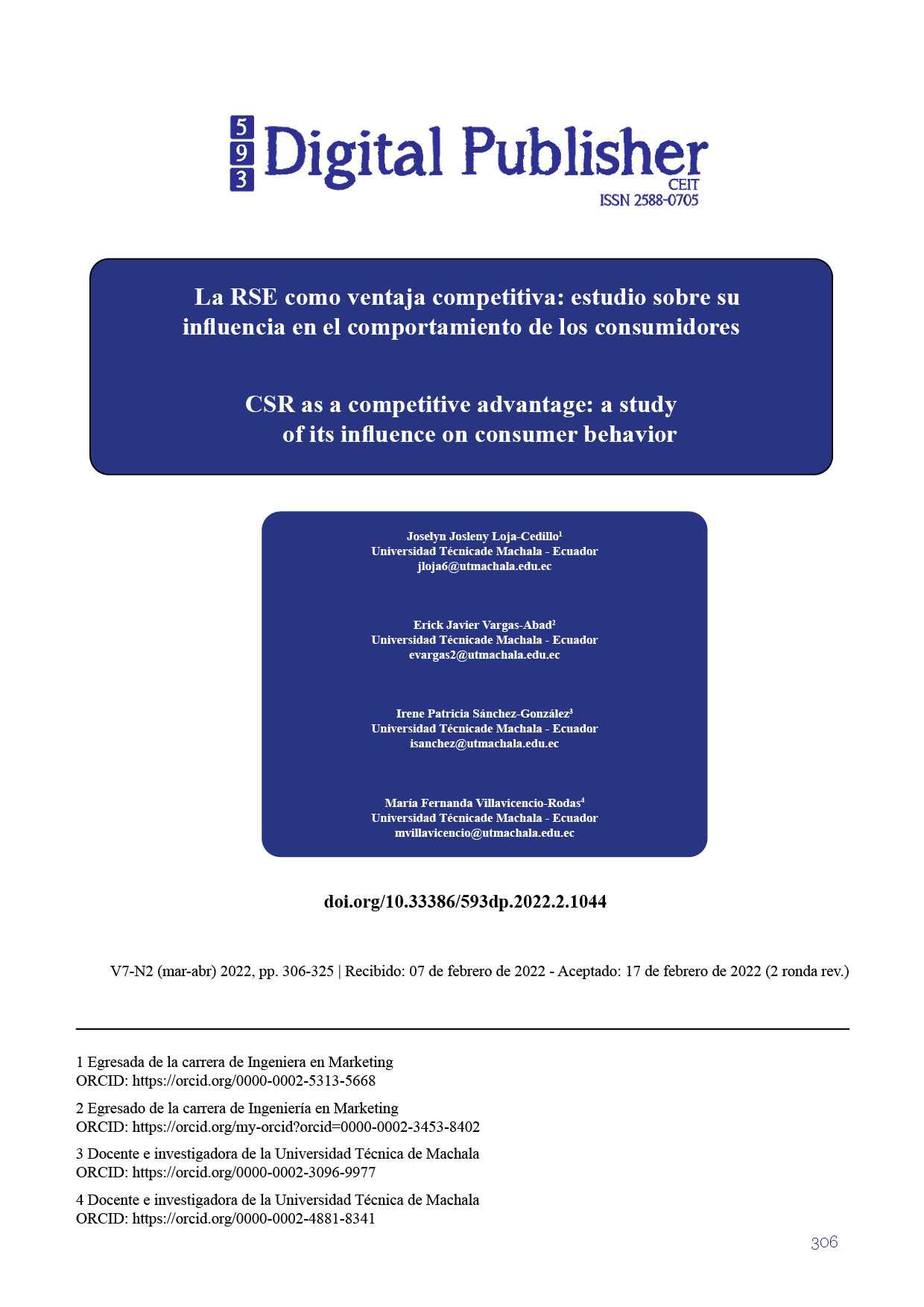La CSR as a competitive advantage: a study of its influence on consumer behavior
Main Article Content
Abstract
Corporate Social Responsibility has become a competitive advantage in the market, thanks to the fact that consumers value to a greater extent the contribution of companies to their community and natural environment, transforming it into a factor that influences consumer behavior and their image, making it a successful strategy. For these reasons, the objective was established to analyze the influence of Corporate Social Responsibility on perceived value, engagement, and purchase intention, since these are decisive variables in consumer behavior. Therefore, exploratory research with a quantitative approach was carried out, using a theoretical model of relationships on a sample of 384 consumers of hypermarkets in El Oro (province of Ecuador), contrasted through a structural equation model SEM with PLS 3 and IBM SPSS. The results revealed that Corporate Social Responsibility has a positive influence on consumers, because it allows them to gain a reputation that is reflected through positive perceptions by them, giving way to generate a mutual engagement that influences their purchase intention. Thus, it was concluded that Corporate Social Responsibility should be the object of investment by hypermarkets, for its development and application as a long-term strategic decision, aimed at strengthening their corporate image and fostering lasting relationships, which will allow them to find the desired success in the current and future market.
Downloads
Article Details

This work is licensed under a Creative Commons Attribution-NonCommercial-ShareAlike 4.0 International License.
1. Derechos de autor
Las obras que se publican en 593 Digital Publisher CEIT están sujetas a los siguientes términos:
1.1. 593 Digital Publisher CEIT, conserva los derechos patrimoniales (copyright) de las obras publicadas, favorece y permite la reutilización de las mismas bajo la licencia Licencia Creative Commons 4.0 de Reconocimiento-NoComercial-CompartirIgual 4.0, por lo cual se pueden copiar, usar, difundir, transmitir y exponer públicamente, siempre que:
1.1.a. Se cite la autoría y fuente original de su publicación (revista, editorial, URL).
1.1.b. No se usen para fines comerciales u onerosos.
1.1.c. Se mencione la existencia y especificaciones de esta licencia de uso.
References
Aguilar-Barojas, S. (2005). Fórmulas para el cálculo de la muestra en investigaciones de salud. Salud en Tabasco, 11(1-2), 333-338. Obtenido de https://www.redalyc.org/articulo.oa?id=48711206
Antelo-González, Y. Y., y Alfonso-Robaina, D. (2015). Análisis de la Responsabilidad Social Empresarial basado en un modelo de Lógica Difusa Compensatoria. Ingeniería Industrial, 36(1), 58-69.
Antúnez, A., y Díaz, E. (2017). La responsabilidad social y medio ambiental de la empresa: una perspectiva desde Cuba. Revista de Responsabilidad Social de la Empresa(27), 15-40.
Avellán, N. (2019). CONTABILIDAD AMBIENTAL Y LA RESPONSABILIDAD SOCIAL EMPRESARIAL DENTRO DEL PANORAMA MUNDIAL DEL DESARROLLO SOSTENIBLE. Revista ECA Sinergia, 10(2), 105-115.
Ávila, A., & Chaparro, R. (2021). La relación de confianza y compromiso en la intención de compra. COMPÁS EMPRESARIAL, 1(32), 76-92. doi:https://doi.org/10.52428/20758960.v11i32.62
Baby, J., y Londoño, J. (2005). Valor Percibido por el Cliente (VPC), como una herramienta para el análisis competitivo. AD-minister(6), 96-113. Obtenido de http://www.redalyc.org/articulo.oa?id=322327245006
Baez-Santana, R., Zayas-Agüero, P., Velázquez-Zaldívar, R., y Lao-León, Y. (Enero-Abril de 2019). Modelo conceptual del compromiso organizacional en empresas Cubanas. Ingeniería Industrial, 40(1), 14-23. Obtenido de https://www.redalyc.org/articulo.oa?id=360458834003
Batista, S., Buhamra, C., Laroche, M., y Rodríguez, A. (2017). GREEN PRODUCTS: A CROSS-CULTURAL STUDY OF ATTITUDE, INTENTION AND PURCHASE BEHAVIOR. RAM. Revista de Administração Mackenzie, 18(5), 12-38. doi:10.1590/1678-69712017/administracao.v18n5p12-38
Belsley, D. A. (1991). Conditioning Diagnostics: Collinearity and Weak Data in Regression. (J. W. Sons., Ed.) New York.
Bom-Camargo, Y. (2021). Hacia la responsabilidad social como estrategia de sostenibilidad en la gestión empresarial. Revista de Ciencias Sociales, XXVII(2), 1-16.
Camacho, J. (2015). Las normas de responsabilidad social. Su dimensión en el ámbito laboral de las empresas. Revista latinoamericana de derecho social, 52-55.
Cambra-Fierro, J., Melero-Polo, I., y Sese, J. F. (2016). Can complaint-handling efforts promote customer engagement? Service Business, 10(4), 847-866.
Carrillo-Punina, A. (2017). Responsabilidad social en las pymes latinoamericanas y españolas. CienciAmérica, 6(1), 51-55.
Chin, W. W. (1998). The Partial Least Squares approach to Structural Equation Modelling. En E. G. Marcoulides (Ed.), Modern Methods for Business Research (págs. 295-358). Mahwah, NJ: Lawrence Erlbaum Associates, Publisher.
Cuesta-Santos, A., Fleitas-Triana, S., García-Fenton, V., Hernández-Darias, I., Anchundia-Loor, A., y Mateus-Mateus, L. (2018). Evaluación del desempeño, compromiso y gestión de recursos. Ingeniería Industrial, XXXIV(1), 24-35. Obtenido de http://www.rii.cujae.edu.cu
De la Oliva, E., Gallart, V., y Fernández, L. (19 de Junio de 2019). Compromiso activo y valor de marca en el sector del lujo. REDMARKA. Revista De Marketing Aplicado, 23(1), 91-106. Obtenido de https://doi.org/10.17979/redma.2019.23.1.5457
Diamantopoulos, A., Riefler, P., y Roth, K. P. (2008). Advancing formative measurement models. Journal of Business Research, 61(12), 1203-1218. doi:https://doi.org/10.1016/j.jbusres.2008.01.009
Duque, Y. V., Cardona, M., y Rendón, J. (2013). Responsabilidad Social Empresarial: Teorías, índices, estándares y certificaciones. Cuadernos de Administración, 29(50), 196-206.
Echeverría-Ríos, O. M., Abrego-Almazán, D., y Medina-Quintero, J. (2018). La responsabilidad social empresarial en la imagen de marca afectiva y reputación. INNOVAR, 28(69), 133-147. doi:https://doi.org/10.15446/innovar.v28n69.71703
Eleni, C., y Vasse, T. (2019). Are Consumers International? A Study of CSR, Cross-Border Shopping, Commitment and Purchase Intent among Online Consumers. JOURNAL OF GLOBAL MARKETING, 32(4), 239–254. doi:https://doi.org/10.1080/08911762.2018.1528652
Ferrando, P. J., y Anguiano-Carrasco, C. (2010). EL ANÁLISIS FACTORIAL COMO TÉCNICA DE INVESTIGACIÓN EN PSICOLOGÍA. Papeles del Psicólogo, 31(1), 18-33. Obtenido de http://www.redalyc.org/articulo.oa?id=77812441003
Fornell, C., y Larcker, D. (1981). Evaluating structural equation models with unobservable variables and measurement error. Journal of Marketing Research, 18(1), 39-50. doi:https://doi.org/10.2307/3151312
Gallarza, M. G., Gil, I., y Arteaga, F. (17 de Junio de 2019). Conceptualización y medición del valor percibido: consensos y controversias. Cuadernos de Gestión, 20(1), 65-88. doi:10.5295/cdg.180997mg
García-Morales, E., Rojo-Simental, E., y Portillo-Castillo, V. (2018). Grado de responsabilidad social empresarial de una compañía de supermercados en Ciudad Juárez. ECORFAN, 10-16.
Giraldo, W., y Otero, M. (2018). Efectos en la intención de compra a partir del valor de marca, la actitud hacia el dinero y el estilo parental. ESPACIOS, 39(26), 10-22.
Hair, J. F., Hult, G. T., Ringle, C., y Sarstedt, M. (2016). A primer on partial least squares structural equiation modeling (PLS-SEM). . Los Ángeles: Sage Publications.
Henao, L. (2019). Calidad de servicio y valor percibido como antecedentes de la satisfacción de los clientes de las empresas de telecomunicaciones en Colombia. Contaduría y Administración, 65(3), 1-23. Obtenido de http://dx.doi.org/10.22201/fca.24488410e.2020.2318
Imelia, R., y Ruswanti, E. (2017). Factors Affecting Purchase Intention of Electronic House wares in Indonesia. International Journal of Business and Management Invention, 6(2), 37-44.
INEC. (4 de Mayo de 2018). Módulo de Información Ambiental Económica en Empresas 2016. Obtenido de INEC: https://anda.inec.gob.ec/anda/index.php/catalog/627/download/10718
Ingaldi, M., Brožovà, S., y Zhuravskaya, M. (2021). SOCIAL AWARENESS AND RESPONSIBILITY IN CONTEXT OF POLISH SERVICE COMPANIES. SYSTEM SAFETY: HUMAN - TECHNICAL FACILITY - ENVIRONMENT, 3(1), 71-78. doi:10.2478/czoto-2021-0008
Lara, I., y Sánchez, J. (2021). RESPONSABILIDAD SOCIAL EMPRESARIAL PARA LA COMPETITIVIDAD DE LAS ORGANIZACIONES EN MÉXICO. Mercados y Negocios, 96-108. doi:https://doi.org/10.32870/myn.v0i43.7546
Leckie, C., Rayne, D., y Johnson, L. W. (2021). Promoting Customer Engagement Behavior for Green Brands. Sustainability, 13(15), 1-22. doi:https://doi.org/10.3390/su13158404
Limayen, M., Khalifa, M., y Frini, A. (2000). What makes consumers buy from internet? A longitudinal study of online shopping. IEEE Transactions on Systems, Man, and Cybernetics - Part A: Systems and Humans, 30, 421-432.
López-Pérez, M., Melero-Polo, I., Vázquez-Carrasco, R., y Cambra-Fierro, J. (2018). Sustainability and Business Outcomes in the Context of SMEs: Comparing Family Firms vs. Non-Family Firms. Sustainability, 10(11), 1-16. doi:https://doi.org/10.3390/su10114080
Maignan, I., Ferrell, O., y Ferrell, L. (2005). A stakeholder model for implementing social responsibility in marketing. European Journal of Marketing, 39, 956-977. doi:https://doi.org/10.1108/03090560510610662
Martín, D., Castro, C., y Martín, E. (2004). EL VALOR PERCIBIDO DE UN SERVICIO. Revista española de investigación de marketing ESIC, 47-734. Obtenido de https://core.ac.uk/reader/161254694
Mawson, S. (2018). CUSTOMER PERCEIVED VALUE IN HIGH GROWTH FIRMS. Cuadernos Delaware Economía, 37(75), 755-778. doi:10.15446/cuad.econ.v37n75.68913
Mohammed, A., y Al-Swidi, A. (2019). The influence of CSR on perceived value, social media and loyalty in the hotel industry. Spanish Journal of Marketing, 23(3), 373-396. doi:10.1108/SJME-06-2019-0029
Moorman, C., Zaltman, G., y Deshpande, R. (1992). Relationships between Providers and Users of Market Research: The Dynamics of Trust within and between Organizations. Journal of Marketing Research, 29(3), 314-328. doi:https://doi.org/10.2307/3172742
Murillo, M., y Ruiz-Mafé, C. (Junio de 2020). Influence of perceived value on emotions and consumer behaviour in mobile commerce in the fashion industry. Business and Society Review, 17(4), 54-91. doi:10.3232/UBR.2020.V17.N4.02
Nunnally, J. C. (1978). Psychometric Theory. (McGraw-Hill, Ed.) New York.
Ormaza, J., Ochoa, J., Ramírez, C., y Ochoa, C. (2018). PERCEPCIÓN DE LA RESPONSABILIDAD SOCIAL EMPRESARIAL EN LOS CONSUMIDORES DE SUPERMERCADOS DE LA CIUDAD DE AZOGUES. ECOCIENCIA, 6(3), 1-21.
Ormaza, J., Ochoa, J., Ramírez, F., y Quevedo, J. (2020). RESPONSABILIDAD SOCIAL EMPRESARIAL EN EL ECUADOR: ABORDAJE DESDE LA AGENDA 2030. Revista de Ciencias Sociales, XXVI(3), 1-18. Obtenido de https://www.redalyc.org/journal/280/28063519009/html/
Ortega, D., Niebles, W., y Hernadez, H. (2018). Organizational Challenges in Small and Medium Enterprises on the Colombian. Indian Journal of Science and Technology, 11(45), 1-5. doi:10.17485/ijst/2018/v11i45/137681
Pacto Mundial. (27 de Diciembre de 2021). La Asamblea General de la ONU reafirma el mandato del Pacto Mundial de Naciones Unidas para involucrar a las empresas en la acción sobre los ODS. Obtenido de Pacto Mundial Red Española: https://www.pactomundial.org/noticia/la-asamblea-general-de-la-onu-reafirma-el-mandato-del-pacto-mundial-de-naciones-unidas-para-involucrar-a-las-empresas-en-la-accion-sobre-los-ods/
Pavlou, P. A., y Gefen, D. (2005). Psychological contract violation in online marketplaces: Antecedents, consequences, and moderating role. Information Systems Research, 16(4), 372-399.
Pérez, A., y Rodríguez del Bosque, I. (2014). Customer CSR expectations in the banking industry. International Journal of Bank Marketing, 32, 223-244. doi:https://doi.org/10.1108/IJBM-09-2013-0095
Pérez, M., Espinoza, C., y Peralta, B. (2016). LA RESPONSABILIDAD SOCIAL EMPRESARIAL Y SU ENFOQUE AMBIENTAL: UNA VISIÓN SOSTENIBLE A FUTURO. Universidad y Sociedad, 8(3), 169-178.
Petro, J., Díaz, T., Vega, M., Periñán, J., y Maza, J. (2020). Efectos de la implementación de actividades de responsabilidad social empresarial en un supermercado de Cartagenade Indias, Colombia. Revista de jovenes investigadores Ad Valorem, 3(1), 1-19.
Pípoli de Azambuja, G. M., García-Arrizabalaga, I., y Rodríguez-Peña, G. (2019). Do image and familiarity have a significant effect on purchase intention? Estudios Gerenciales, 35(152), 249-258. doi:https://doi.org/10.18046/j.estger.2019.152.3281
Rocha, F. R., Curiel, J. d., y Cunha, L. R. (Junio de 2020). La relación entre la confianza y el compromiso y sus efectos en la lealtad de marca. MÉTODOS CUANTITATIVOS PARA LA ECONOMÍA Y LA EMPRESA, 29, 131-151. Obtenido de https://doi.org/10.46661/revmetodoscuanteconempresa.3839
Rungsrisawat, S., y Sirinapatpokin, S. (2019). Impact of brand equity on consumer purchase intent. Utopía y Praxis Latinoamericana, 24(6), 359-369. Obtenido de https://www.redalyc.org/articulo.oa?id=27962177038
Salgado, L., y Espejel, J. E. (2016). Análisis del estudio de las relaciones causales en el marketing. Innovar, 26(62), 79-94. doi:https://doi.org/10.15446/innovar.v26n62.59390
Sánchez-González, I., Gil-Saura, I., y Ruiz-Molina, M. (2020). Efectos del desarrollo sostenible percibido por el consumidor. Una propuesta de modelo. Estudios Gerenciales, 36(154), 27-42. Obtenido de https://doi.org/10.18046/j.estger.2020.154.3470
Servera-Francés, D., y Piqueras-Tomás, L. (2019). The effects of corporate social responsibility on consumer loyalty through consumer perceived value. Economic Research - Ekonomska Istraživanja, 66-84.
Servera-Francés, D., Fuentes-Blasco, M., y Piqueras-Tomás, L. (2020). The Importance of Sustainable Practices in Value Creation and Consumers’ Commitment with Companies’ Commercial Format. Sustainability(12), 1-14. doi:10.3390/su12239852
Sistema Nacional de Información. (2021). PROYECCIONES A NIVEL PROVINCIAL POR SEXO Y EDADES SIMPLES. Obtenido de Proyecciones y Estudios Demográficos: https://sni.gob.ec/proyecciones-y-estudios-demograficos
Steemkamp, J., y Geyskens, I. (2006). How Country Characteristics Affect the Perceived Value of Web Sites. Journal of Marketing, 70(3), 136-150.
Supercias. (10 de Agosto de 2020). Forbes Ecuador publica artículo con información del Ranking Empresarial de Supercías. Obtenido de Superintendencia de Compañías, Valores y Seguros: https://portal.supercias.gob.ec/wps/wcm/connect/supercias/asbannernoticias/asbpnfragmentocontenido/crankingforbes
Supercias. (23 de Diciembre de 2021). Ranking: Las 10 empresas con mayores ingresos en Ecuador. Obtenido de Superintendencia de Compañías, Valores y Seguros: https://www.supercias.gob.ec/portalscvs/
Sweeney, J. C., y Soutar, G. N. (2001). Consumer perceived value: The development of a multiple item scale. Journal of Retailing, 77(2), 203-2020. doi:https://doi.org/10.1016/S0022-4359(01)00041-0
Tapia, A., Gavilánez, M., Jácome, S., y Balseca, J. E. (2018). La responsabilidad social empresarial: un desafío para la sostenibilidad de las empresas del Ecuador. 3C Empresa. Investigación y pensamiento crítico, 7(4), 68-69. Obtenido de http://dx.doi.org/10.17993/3cemp.2018.070436.68-89/
Valdez, M., Jacobo-Hernández, C., y Ochoa-Jiménez, S. (2021). Los beneficios de la responsabilidad social empresarial: una revisión literaria. Revista Tiempo&economía, 8(2), 201-2017. doi:https://doi.org/10.21789/24222704.1720
Vélez, D., y Palacio, S. (09 de Diciembre de 2018). Explorando el valor percibido de los estándares de Responsabilidad Social Empresarial en la cadena de valor del pompón-crisantemo en el altiplano del Oriente antioqueño. LEBRET(10), 207-228. doi:10.15332/rl.v0i10.2204
Vidrio-Barón, S. B., Rebolledo-Mendoza, A. R., y Galindo-Salvador, S. D. (2020). Calidad del servicio hotelero, lealtad e intención de compra. Investigación Administrativa, 49(125), 1-19. doi:https://doi.org/10.35426/iav49n125.02
Villacís, C., Suarez, Y. F., y Güillín, X. (2016). Análisis de la Responsabilidad Social en el Ecuador. Publicando, 8(3), 452- 466.
Villacís-Pérez, W., y Caiche-Morán, R. (2021). La responsabilidad social como herramienta de ventaja competitiva para las pequeñas y medianas empresas. 593, 65-72. doi:http://doi.org/10.33386/593dp.2021.5.608
Zayas, I. (2019). LA COMPETITIVIDAD EN LAS EMPRESAS AGROPECUARIAS A TRAVÉS DE LA RESPONSABILIDAD SOCIAL EMPRESARIAL. Revista Mexicana de Agronegocios, 45, 273-284. Obtenido de https://www.redalyc.org/articulo.oa?id=14162394001





